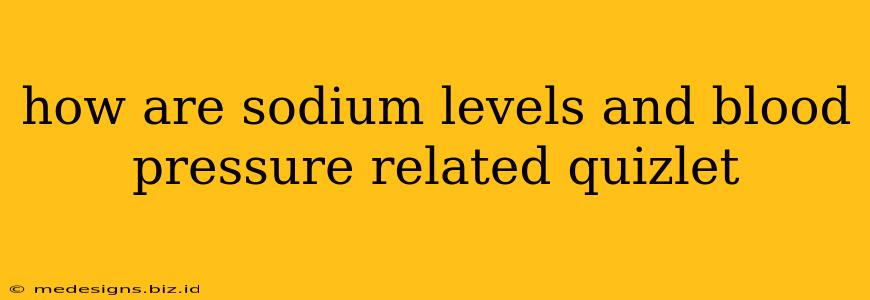How Are Sodium Levels and Blood Pressure Related? A Comprehensive Guide
Understanding the relationship between sodium levels and blood pressure is crucial for maintaining good health. High blood pressure (hypertension) is a major risk factor for heart disease, stroke, and kidney failure, and dietary sodium plays a significant role. This guide will explore this vital connection, answering common questions and providing practical advice.
What is the Connection Between Sodium and Blood Pressure?
The link between sodium and blood pressure is complex, but here's the basic idea:
-
Sodium and Water Retention: When you consume too much sodium, your body retains more water. This increased fluid volume increases the amount of blood your heart has to pump, leading to higher blood pressure. Think of it like a plumbing system – more water in the pipes means higher pressure.
-
Blood Vessel Constriction: High sodium intake can also cause your blood vessels to constrict (narrow). This makes it harder for blood to flow, further increasing blood pressure.
-
Individual Sensitivity: It's important to note that not everyone is equally sensitive to the effects of sodium. Some individuals are more prone to experiencing blood pressure increases with high sodium intake than others. Genetic factors, age, and other health conditions can influence this sensitivity.
Quizlet-Style Questions & Answers:
Here are some key questions and answers in a format similar to Quizlet flashcards to help solidify your understanding:
Q1: What is the primary effect of high sodium intake on the body's fluid balance?
A1: High sodium intake leads to increased water retention.
Q2: How does increased water retention impact blood pressure?
A2: Increased water retention increases blood volume, which in turn increases blood pressure.
Q3: Besides water retention, what is another mechanism by which high sodium intake can raise blood pressure?
A3: High sodium intake can cause blood vessels to constrict, making it harder for blood to flow and raising pressure.
Q4: Is everyone equally sensitive to the blood pressure-raising effects of sodium?
A4: No, individual sensitivity to sodium varies due to factors like genetics, age, and other health conditions.
Q5: What are some health risks associated with high blood pressure?
A5: High blood pressure increases the risk of heart disease, stroke, and kidney failure.
Managing Your Sodium Intake for Better Blood Pressure:
Lowering your sodium intake is a crucial step in managing blood pressure. Here are some practical tips:
-
Read Food Labels Carefully: Pay close attention to the sodium content listed on packaged foods. Choose low-sodium or no-salt-added options whenever possible.
-
Limit Processed Foods: Processed foods are often high in sodium. Opt for fresh, whole foods instead.
-
Cook at Home More Often: This allows you to control the amount of salt you use in your cooking.
-
Use Herbs and Spices: Enhance the flavor of your food with herbs and spices instead of relying on salt.
-
Choose Low-Sodium Condiments: Be mindful of the sodium content in sauces, ketchup, and other condiments.
Conclusion:
The relationship between sodium levels and blood pressure is undeniable. By understanding this connection and making conscious choices to reduce sodium intake, you can significantly improve your cardiovascular health and lower your risk of serious health complications. Remember to consult with your doctor or a registered dietitian for personalized advice on managing your sodium intake and blood pressure.
